
D-F voters to decide three land use ordinance questions on Nov. 6
DOVER-FOXCROFT — When Dover-Foxcroft residents head to the polls on Tuesday, Nov. 6 they will be voting on three land use-related ordinances. Citizens will be asked if they wish to enact a revised land use ordinance, a land use ordinance pertaining to “Mega Projects: Transportation Corridors,” and a land use ordinance pertaining to “Mega Projects: Large-Scale Water Extraction.”
Following a public hearing on Sept. 27 the planning board recommended moving the three questions and accompanying documents forward. Another public hearing on the referendum will be part of the selectmen’s meeting at 6:30 p.m. on Monday, Oct. 22 at the Morton Avenue Municipal Building.
Consultant Gwen Hilton said a land use ordinance committee has been working for about two years, starting in late 2016 after the town’s comprehensive plan was approved. She said the comprehensive plan “is the foundation for the ordinances we are going to talk about tonight.”
“There are three ordinances that we are going to talk about tonight,” Hilton said. “That was a deliberate decision so people could vote on them separately.”
“The three ordinances are integrated, the land use ordinance repeals and replaces what you have now and the mega projects ordinances are supplements,” Hilton said. “They are really designed to provide a framework for any future projects,” she added, saying if passed the ordinances can be amended by a future town meeting vote.
The proposed land use ordinance implements the comprehensive plan and “maintains and enhances the existing administration and permitting functions,” Hilton said, saying the process is designed to be more efficient.
She explained that small land uses with low impacts would have a more streamlined process. The code enforcement officer is able to OK permits for types of identified minor projects. “This means less time to get a permit and fewer requirements,” Hilton said.
The planning board would address larger projects, defined as major and mega in the ordinances, as well as some identified minor projects. Hilton said major and mega projects would involve more comprehensive review, and there will be more opportunity for public participation than before.
“Also in those major and mega projects there would be a lot more additional standards,” Hilton said.
She said the land use ordinances update the various districts across Dover-Foxcroft. “By putting those uses in different districts you are trying to put compatible uses in similar districts and removing non-compatible districts,” Hilton said.
“We have three new industrial districts and they have been carefully placed,” she said. The new areas are around Pleasant River Lumber on the Milo Road, the transfer station and the airport/business park.
The new land use ordinance has an expanded commercial district to provide more land for commercial development. Hilton said there is also increased flexibility in the downtown district to accommodate more and better development.
The mega project ordinances are both subject to the land use ordinance “and there is a more thorough review process with extensive public input,” Hilton said. She said there will be meeting before the planning board and public meetings and hearings in addition to a number of standards and requirements.
Transportation corridors are defined in the ordinance and large-scale water extraction is defined as more than 5,000 gallons a day. “You want to protect yourselves and long-term quality and quantity water resources,” Hilton said.
Planning board Chair Chris Maas said the land use ordinance contains an in-depth section specifying what can and cannot be done in each land use district and when permits and/or site plan reviews by the code enforcement office are needed.
“We have a new category S/CEO,” he said, as site plan review by the code enforcement officer does not need the applicant to go before the planning board.
“We think this was something fair to the people that are there and makes things easier for business people and it makes the town more livable, and it makes the town more business-friendly,” Maas said.
A question posed to the planning board asked if the town has been approached by developers looking to build a mega project. “Not directly but I think some people have been threatened by it, the possibility,” board member Louise Ringle said.
“We want to be ready,” board member Lisa Laser said. She said other towns have not been prepared when developers looked to start water extraction projects in these communities.
“We would probably lose if we just say no, in court,” Maas said. He said there are 25 pages of regulations, “always in the spirit that this is not designed to never happen, it’s a question of how we control.”
“This gives you a powerful tool, a local tool if they don’t meet the criteria and all those standards you can say no,” Hilton said. “I think it’s a pretty high bar myself.”
“What we tried to come up with here is a tool to protect your community and make it grow,” she added.
Another question wondered if any mega project proposals could be brought to a town-wide vote. Hilton said she has not seen such a measure and said “then it becomes a political decision.”
Town Manager Jack Clukey thanked the planning board and land use ordinance committee members for all their work. “We absolutely can say no,” he said. “I think with the comprehensive plan we have over 300 pages of why a project can be denied.”